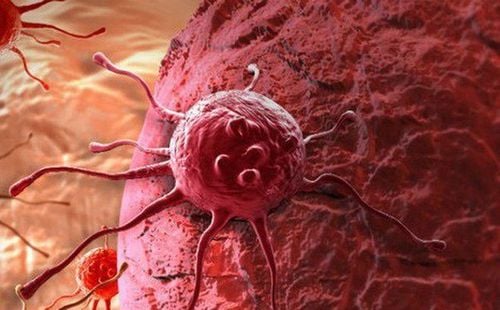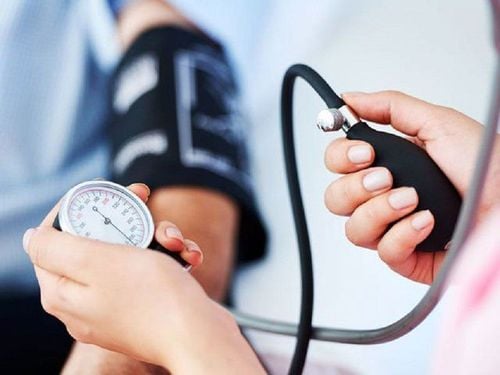This is an automatically translated article.
The article was written by doctors of Internal Medicine Oncology Department - Vinmec Times City International General Hospital.There are many factors that can cause a person to become obese, including genetic, hormonal, environmental, emotional and cultural factors. People who are overweight have an increased risk of many health problems such as type 2 diabetes, high blood pressure and cardiovascular disease. Being overweight is also associated with an increased risk of many types of cancer.
1. Understanding overweight and cancer risk
More than two-thirds of American adults are overweight and obese, making this an important topic for people with cancer. When a person is overweight or obese, it means they have too much fat in lean tissues, such as muscle.
Several studies have explored why being overweight or obese can increase cancer risk and growth. Reasons why obesity is linked to cancer include:
Increased levels of insulin and insulin growth factor-1 (IGF-1), which may help some cancers develop Chronic inflammation, acute inflammation ..., common in obese people linked to increased cancer risk Higher amounts of estrogen are produced by adipose tissue, which can promote the growth of some cancers, such as cancer breast and endometrial cancer Fat cells may influence the process that regulates cancer cell growth. How weight changes over a lifetime is also linked to cancer risk. Studies have shown that the following factors can affect cancer risk:
High birth weight Gaining weight as an adult Repeatedly losing and gaining weight. Research shows that maintaining a healthy weight is associated with a reduced risk of cancer.
2. Being overweight or obese has been linked to the following cancers:

Béo phì đang trên đường thay thế thuốc lá trở thành nguyên nhân số một liên quan đến ung thư
Cancer rates attributed to obesity are as high as 40% for some cancers, especially esophageal and endometrial. Being overweight/obese contributes to 1 in 5 cancer-related deaths.
3. Being overweight or obese is linked to cancers
Breast cancer Colorectal cancer Uterine cancer Kidney cancer Head and neck cancer Esophageal cancer Pancreatic cancer Endometrial cancer Prostate cancer Gallbladder cancer Thyroid cancer.
4. Weight measurement
Obesity is usually measured by body mass index (BMI) and waist measurement. BMI is the ratio of a person's weight and height. A healthy BMI is usually between 18.5 and 24.9. A BMI between 25 and 29.5 is considered overweight, while a BMI of 30 or more is obese.
In addition, people with larger waist measurements have an increased risk of various diseases, such as heart disease. A healthy waist measurement is less than 40 inches for men and under 35 inches for women.
5. Weight management tips
To control weight gain, pay attention to what you eat and how much you exercise. Also make healthy choices for what you eat and drink. This can be challenging because the high-calorie diet is so typical in the United States, includes large amounts of food, is filling, and is relatively low cost. Here's advice to help you:
Eat plenty of vegetables, fruits, lean proteins and whole grains. Certain foods, such as broth-based soups. Avoid foods and drinks that are high in sugar, such as juices and sodas. Only eat and drink as many calories as your body needs to maintain weight and support physical activity levels. Aim for 30 to 60 minutes a day of daily moderate to high intensity physical activity. Even a small increase in physical activity has benefits.
6. Suggestions for people who are overweight or obese
If you are overweight or obese, it is best to start by taking steps to lose weight through nutrition and exercise. Aim to lose 5% to 10% of your body weight as the first goal. While this number may seem small, research shows that even losing 5% to 10% of your weight is beneficial. Most hospitals and healthcare organizations have specialists such as dietitians who can provide weight management advice and treatment.
Sometimes changing nutrition and increasing physical activity are not enough. There are other steps you can take. For example :
Change in lifestyle behavior : First, change behavior to reduce food intake and increase physical activity. A dietitian, physiologist, psychologist, or doctor who specializes in weight loss can help. Support behavior change: For many people, being overweight or obese is more complicated than simply eating too much and exercising too little. It's important to get support when you're trying to lose weight. Most weight loss programs include sessions with a dietitian or weight loss specialist to help you make healthy lifestyle changes and stick with them over time. Medications: Weight loss medications are usually only recommended when diet, exercise, and behavioral support aren't working. Or if you are suffering from another serious health condition due to obesity. Surgery: Can make the stomach smaller. This is called bariatric surgery or bariatric surgery. This may be an option for people with a BMI of 40 or more. Or for people with a BMI of 35 or more who have another serious health condition related to obesity.

Tạp thể dục và theo dõi các chỉ số cơ thể thường xuyên để giảm cân
7. Need to talk to a medical professional about weight loss
Consider the following questions:
Is my weight unhealthy? How is extra weight bad for my health? How will losing weight improve my health? How much weight do I need to lose? How much weight should I lose per week? What programs and treatments are available to help me lose weight? Can you recommend professionals who can help me develop a weight loss program? Where can I find information about healthy eating? Where can I find information about assignments?
Obesity is on its way to replacing tobacco as the number one cancer-related cause. We need to confront this growing problem and use all the tools we need to limit its impact (Cliord Hudis, President of the American Society of Clinical Oncology). In 2007, there were more than 84,000 obesity-related cancers.
Everyone needs to take control of their own weight and health. When noticing unusual weight gain or showing signs of harmful factors to the body, patients should visit a doctor to be diagnosed with a medical condition in order to provide scientific treatment.
Customers can directly go to Vinmec Health system nationwide to visit or contact the hotline here for support.
Articles refer to the source: Cancer.net
SEE MORE:
Nutrition - an important factor in the prevention and treatment of diabetes What are the risks of trans fat to health? The relationship between trans fats and cholesterol













